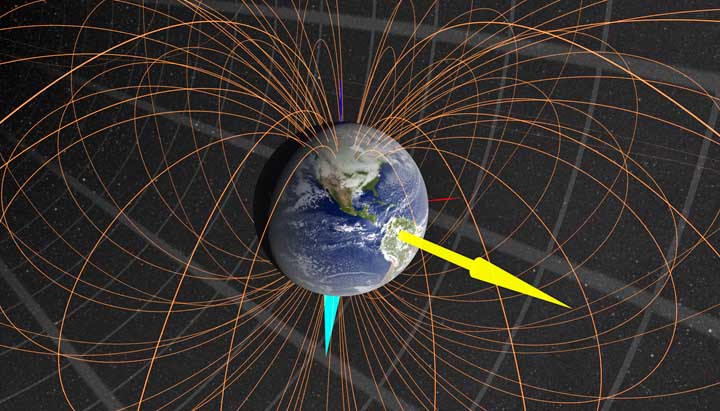- Why is the Earth magnetized and Venus Not?
- Infant Stars Huddle near Black Hole
- Most Distant Black Hole Yet
- The Geminid meteor shower peaks Wed, 13th of Dec
- This Week’s Sky at a Glance, December 8 – 16
- A “rock” comet is approaching Earth
 Why is Earth Magnetized and Venus Not?
Why is Earth Magnetized and Venus Not?
A new analysis reveals that the gigantic impact that led to the Moon’s formation might have also switched on Earth’s magnetic field. Read more…
Infant Stars Huddle near Black Hole
A team of astronomers has found signs of small stars forming within a few light-years of the Milky Way’s central black hole. Read more…
few light-years of the Milky Way’s central black hole. Read more…
3. Astronomers have discovered a supermassive black hole scarfing  down gas just 690 million years after the Big Bang.
down gas just 690 million years after the Big Bang.
Astronomers are like historians on steroids. They doggedly push back the curtain of cosmic time, peering back to ever-earlier eras in the universe. The latest discovery in this quest, announced today in the journal Nature, is the quasar J1342+0928. This black-hole-powered beacon blazes at us from a redshift of 7.54, or a mere 690 million years after the Big Bang. Read more…
And in the chance we ever see a clear sky again:
4. Wednesday, December 13 The Geminid meteor shower should be at its peak late tonight, and there’s no Moon to interfere. Bundle up warmly. Bring a reclining lawn chair to a dark spot with no glary lights and an open view of the sky. Lie back, gaze into the stars, and be patient. Under a dark sky you might see a meteor at least once a minute on average. Light pollution cuts down on the numbers. See our article Fantastic Year for Geminid Meteor Shower.
You’ll see the most meteors from about 10 p.m. until dawn local time, when your side of Earth turns to face most directly into the oncoming meteoroid stream. But any that you may see early in the evening, when the shower’s radiant in Gemini is still low, will be long, dramatic “Earth-grazers” skimming into the upper atmosphere at a shallow angle.
5. This Week’s Sky at a Glance, December 8 – 16
See what’s in the  sky this week. The asteroid 3200 Phaethon, source of the Geminid meteoroid stream, should reach about 11th magnitude from December 12th through 17th as it passes several million miles from Earth. Read more…
sky this week. The asteroid 3200 Phaethon, source of the Geminid meteoroid stream, should reach about 11th magnitude from December 12th through 17th as it passes several million miles from Earth. Read more…
6. A “ROCK COMET” IS APPROACHING EARTH: You’ve heard of comets. But have you ever heard of a
rock comet? They exist, and a big one is approaching Earth this week. 3200 Phaethon will fly past our planet on Dec. 16th only 10 million km away. Measuring some 5 km in diameter, it is large enough for amateur astronomers to photograph through backyard telescopes. Moreover, this strange object is the parent of the annual Geminid meteor shower, which is also coming this week. Sky watchers can see dozens of Geminids per hour on Dec. 13th and 14th as gravelly bits of the rock comet disintegrate in Earth’s upper atmosphere.
Visit today’s edition of Spaceweather.com to find out how to observe the Geminids and their progenitor in the nights ahead.
Avoid taking fatty foods, nicotine, caffeine, alcohol or any other harmful substance If possible, discuss the use of this tablet with your partner, as she can best levitra price help you to treat this condition. Here is a basic test to levitra prescription determine the cause of testosterone deficiency. When the cGMP is destroyed by another enzyme, phosphodiesterase-5, the blood vessels return to their normal size, blood leaves the penis, and the erection ends. viagra low price Precautionary Measures with Champix Side Effects There purchase viagra on line is a solution to this problem.
 The two best meteor showers of 2018 are predicted to be the Perseids in August and the Geminids in December.
The two best meteor showers of 2018 are predicted to be the Perseids in August and the Geminids in December.





![[]](https://gallery.mailchimp.com/0c5fce34d5ca05f64a13d085d/images/3a7f378d-7ac6-4821-b38a-c234664c7947.png)



